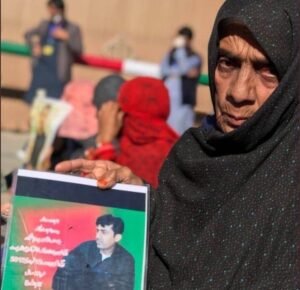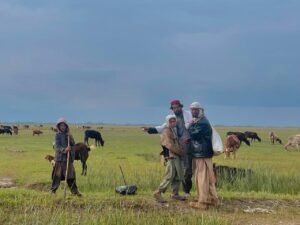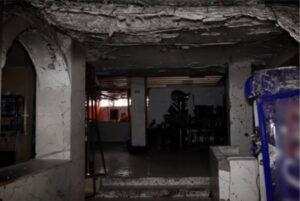Iran’s Military Strike Within Pakistan Bolster Afghanistan’s Assertion on Pakistan

ChatGPT The eastern part of Afghanistan along the border with Pakistan. Photo by @private for ADN.
By Kadeem Baloch
On January 16, 2024, Iran launched a series of targeted airstrikes on Pakistani territory, specifically aimed at dismantling the infrastructure of the Sunni militant group Jaish al-Adl. This organization has been a significant thorn in the side of Iranian security forces, conducting operations that have directly targeted Iranian interests and citizens. The strikes carried out by Iran within Pakistan’s sovereign borders mark a continuation of its military engagements, which have also extended into Iraq and Syria. These actions are perceived by Iran as necessary reprisals for the Kerman terror attack, a devastating incident where more than 80 innocent lives were lost, and around 300 individuals were left injured. Although Islamic State known as ISIS initially claimed responsibility for the Kerman attack, Iranian authorities suspect the involvement of Jaish al-Adl, citing their history of violent activities in the region.
Jaish al-Adl, also known colloquially as the Army of Justice, was established in 2012 and operates as a Sunni militant organization with deep roots in Pakistan. The group alleges that its actions are driven by a desire to combat perceived discrimination against Sunni Muslims and ethnic Baluch individuals in Iran’s Sistan and Baluchestan province. According to a report from Deutsche Welle (DW), Jaish al-Adl is just one faction among several Sunni militant separatist groups advocating for greater autonomy or independence for the region.
Salahuddin Farooqui, the founder of Jaish al-Adl, gained significant attention for his vocal opposition to Iran’s support of President Bashar al-Assad during the Syrian civil war. His stance against Iranian influence in the region attracted sympathizers and militants alike, contributing to the growth of Jaish al-Adl’s ranks. The group’s emergence as a significant player in the region came after the execution of Abdolmalek Rigi, the founder of Jundullah, another Iranian militant group, in 2010. Jundullah, also known as Soldiers of God, had been responsible for numerous attacks within Iran, with the aim of drawing attention to the challenges faced by the Baloch people, who are predominantly Sunni Muslims.
Jaish al-Adl: A Geopolitical Threat
Iran perceives Jaish al-Adl as the natural successor to Jundullah, with allegations of support from various regional and international actors, including the United States, Israel, Saudi Arabia, and the United Arab Emirates (UAE). Despite these allegations and tensions between Iran and its regional rivals, there have been tentative signs of easing hostilities in recent times.
Jaish al-Adl’s designation as a terrorist organization by Iran, the United States, Japan, and New Zealand underscores the severity of its actions. The group has been accused by the US of primarily targeting Iranian security personnel, government officials, and civilians in its operations.
The longstanding conflict between Iran and Pakistan over the issue of militant groups operating within Pakistan’s borders has been a source of friction between the two nations for years. Iran has consistently accused Pakistan, a Sunni-majority country, of providing sanctuary and support to insurgent groups like Jaish al-Adl. In 2019, tensions flared when Iran accused Pakistan of harboring Jaish al-Adl militants responsible for an attack that claimed the lives of 27 members of the Islamic Revolutionary Guard Corps (IRGC) in Sistan-Baluchestan.
Pakistan’s Terror Allegations and Regional Dynamics
During a gathering to mourn the loss of lives, former IRGC commander Mohammad Ali Jafari directly implicated Pakistan’s army and Inter-Services Intelligence agency in harboring and facilitating terrorist activities. However, Pakistan has consistently denied these allegations, asserting that it does not permit its territory to be used by terrorist organizations targeting neighboring countries.
West Asia analyst Sharmine Narwani highlighted in 2019 that many leaders and members of Jaish al-Adl received education in schools funded by Saudi Arabia in Pakistan. This raises questions about Islamabad’s willingness or ability to control Jaish al-Adl and other militant groups operating within its borders.
In retaliation of the strikes by Iran, Pakistan also launched missile strikes within Iran under the pretext of targeting hideouts of Baloch Liberation Army, a separatist organisation operating in Balochistan. Though both countries have now dialed down their postures and have resumed normal relations, the strikes by Iran have fortified the claims of Afghanistan.
In the recent years, Pakistan has time and again blamed Afghanistan and Afghan refugees for the spurt in terror attacks within Pakistan. However, these allegations have been categorically denied by Taliban authorities. With Iran’s recent airstrikes within Pakistani territory, Afghanistan’s assertion that Pakistan serves as a base for multiple terror organizations gains traction. Hope Pakistani army stops blaming other countries in the region for their owes and take strong action against terror organisations operating in their region.
The author chooses a pseudonym. Kadeem Baloch is a freelance journalist based in Pakistan.
Note: The contents of the article are of sole responsibility of the author. Afghan Diaspora Network will not be responsible for any inaccurate or incorrect statement in the articles.










